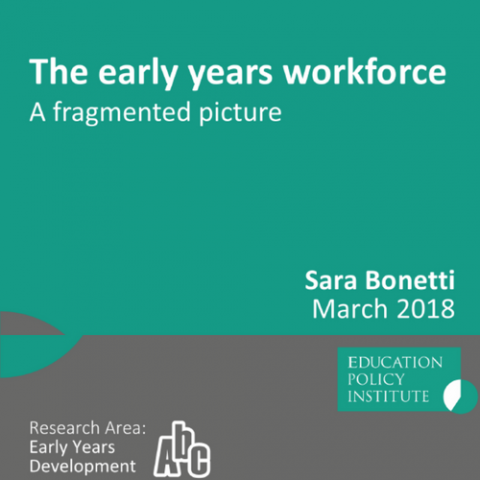Today, The Education Policy Institute published a comprehensive analysis of the early years workforce in England. The analysis studies the latest publicly available data to build a detailed picture of the present day workforce. It examines staff composition, qualifications, pay and other trends at a provider, national and regional level, and assesses the implications of these findings for the future of early years provision.
Key findings
Overall trends in the early years workforce:
There has been an increasing reliance on unpaid staff in the early years sector, raising questions about skills and qualifications. In reception classes, as many as 16% of staff are unpaid volunteers.
Despite increasing evidence that the workforce is key to high quality early years provision, there has been a decline in the number of providers with highly-qualified staff. The percentage of two-year-olds with a graduate in the classroom has been decreasing – from 45% in 2014 to 44% in 2016.
National averages mask strong regional disparities. In London and Yorkshire and the Humber, the proportion of graduates in the workforce fell respectively from 47% to 41% and from 48% to 44%.
In line with similar trends affecting schools, turnover for early years staff has been increasing over the last few years – with turnover rates standing at 14% for group-based providers, 8% for nurseries and 9% for reception.
Women account for 97% of teachers in pre-primary education in the UK. This is in stark contrast to the tertiary education sector, where 44% of workers are women.
Qualifications of early years workforce:
Government data shows that 79% of group-based staff, 77% of nursery staff, 74% of reception staff and 69% of childminders have at least a level 3 early years qualification (official ‘Early Years Educator’ status). However, for the first time in years, these qualification levels are on a downward trend. Separate survey data also shows that, overall, those with at least a level 3 fell from 83% in 2015, to 75% in 2016.
Almost half of highly qualified staff (level 6 and more) are aged over 40, with 21 per cent aged over 50 and approaching retirement in the next 10 to 15 years. Findings around incentives and current enrolment in level 3 initial teacher training cast a doubt on the capacity of the younger workforce to keep the proportion of graduates steady, let alone for it to increase. This potentially means that the early years workforce in the future could be even less qualified than today.
Career progression has slowed in the workforce – with fewer staff now working towards higher qualifications. In 2016, the proportion of staff not working towards a higher qualification stood at: 79% for group-based providers, 82% for nursery schools, 83% for reception, and 92% for childminders. These findings reinforce the downward trend in qualifications levels. Such trends may be down to the increasing financial strains on the sector, increasing cost of obtaining qualifications and lack of financial and status incentive to pursue higher qualifications.
Pay of early years workforce:
The early years workforce suffers from comparatively low pay. On average, pre-primary teachers are paid less than tertiary-education workers, earning just 83% of their average salary in England.
Despite the level of qualification required to be a pre-primary teacher having increased over time, wages have not followed the same trend.
While pay is low in general, it can range considerably from, on average, £8.30 for staff working in group-based providers, to £14.40 for nursery staff in school-based providers, to £15.10 for reception staff.
Working in school-based settings provides more financial incentives to staff to progress up the career ladder. The average pay for more junior staff in school-based provision is higher than more senior staff in group-based early years provision.
The introduction of the National Minimum and Living Wages have been a positive development for workers in the sector. However, planned staff wage increases are likely to drive up overall costs significantly, threatening to put some providers out of business. To compensate, this may result in providers charging parents higher fees, or hiring less qualified staff.
Sara Bonetti, Associate Director of Early Years at the Education Policy Institute, said:
“While there have been some positive measures to support the early years workforce, such as increases in staff pay, our analysis highlights a number of unwelcome trends emerging, which pose a threat to the quality of provision in England.
Staff qualification levels remain low – with levels even declining among staff working with the very youngest children. In the near term, a lack of highly trained staff may hinder the recent expansion of childcare entitlements. In the long-term, there is considerable risk that a continued fall in qualification levels will have a negative impact on children, particularly the most vulnerable.
To ensure the future sustainability of early years provision, it is vital that the government recognises these worrying trends and takes steps to deliver on commitments set out in its workforce strategy.”
You can find the full report on our Knowledge Hub.

